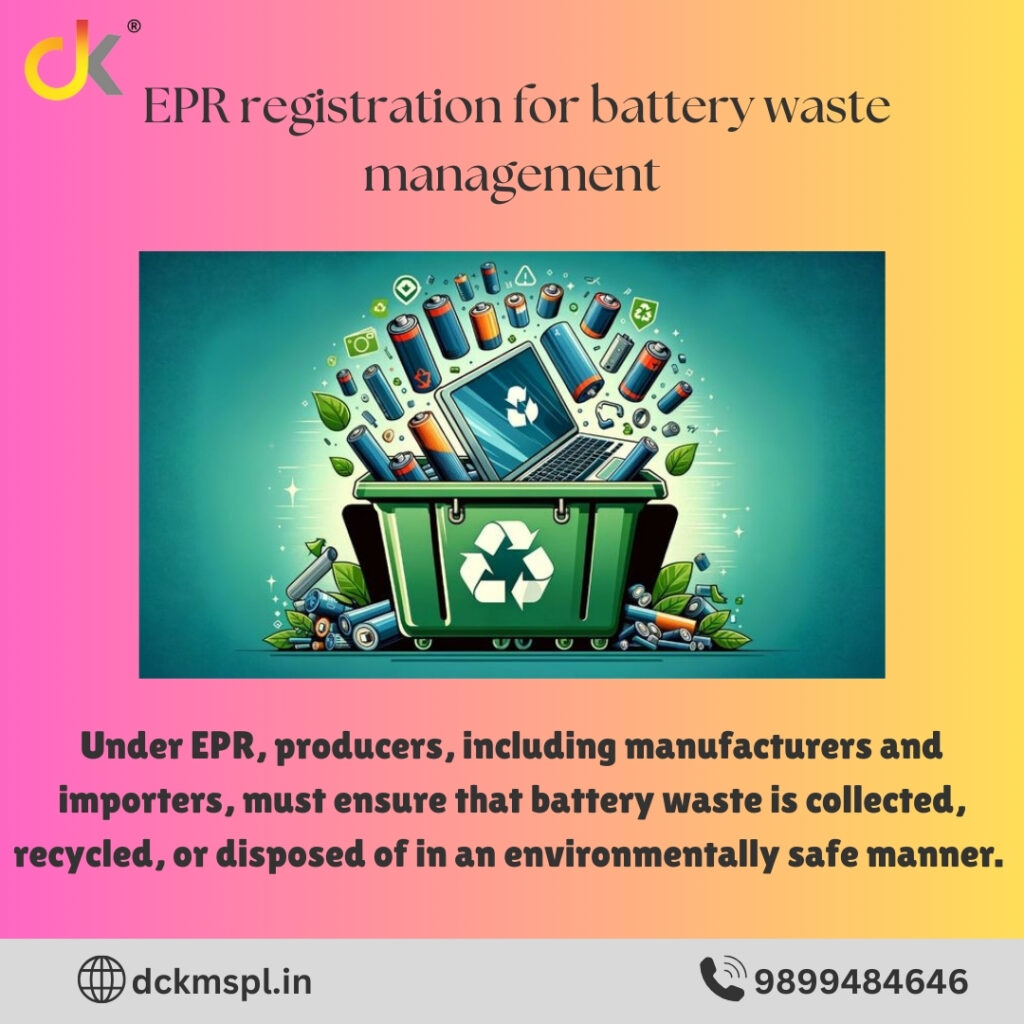
As the world faces increasing environmental challenges, the proper management of hazardous waste has become more critical than ever.
As the world faces increasing environmental challenges, the proper management of hazardous waste has become more critical than ever. Battery waste, in particular, poses significant risks due to the toxic substances it contains, such as lead, mercury, and cadmium, which can cause severe environmental and health problems if not managed properly. In response to these challenges, Extended Producer Responsibility (EPR) has emerged as a vital regulatory framework to manage battery waste sustainably. This article explores the key aspects of EPR registration for battery waste management, the benefits of EPR, and the steps involved in the registration process.
What is Extended Producer Responsibility (EPR)?
EPR registration for battery waste management is a policy approach that places the responsibility of managing post-consumer products, including batteries, on the producers. Producers include manufacturers, importers, or brand owners who place products on the market. The goal of EPR is to reduce the environmental impact of waste, promote the recycling and reuse of products, and encourage producers to design products with end-of-life considerations in mind. Under EPR, producers must collect, recycle, or dispose of battery waste in a manner that minimizes harm to the environment and public health. EPR policies are increasingly being adopted worldwide to tackle the growing problem of hazardous waste generated by batteries.
Why is EPR Important for Battery Waste Management?
- Environmental Protection: Batteries contain hazardous chemicals such as lead, cadmium, and mercury, which can leak into the soil and water, causing contamination. EPR ensures the proper recycling and disposal of batteries, reducing environmental damage.
- Public Health: The improper handling of battery waste can lead to serious health issues, including respiratory problems and nervous system disorders. By ensuring safe disposal and recycling, EPR helps protect public health.
- Resource Conservation: Many components of batteries, such as lithium, nickel, and cobalt, are valuable resources that can be recovered through recycling. EPR promotes the efficient use of these materials, reducing the need for new resource extraction.
- Sustainable Waste Management: EPR encourages the development of sustainable systems for collecting, processing, and disposing of battery waste. This helps reduce the burden on landfills and lowers the overall environmental footprint.
EPR Registration for Battery Waste: The Process
To comply with the EPR framework, producers must undergo a formal registration process. Here are the key steps involved in EPR registration for battery waste management:
1. Authorization Application
Producers must apply for authorization from the relevant environmental regulatory authority. The application process typically involves submitting documents that outline the producer’s waste management plan, including details on collection mechanisms, recycling partners, and the company’s overall strategy for managing battery waste.
2. Reporting and Auditing
Once registered, producers are required to submit regular reports to the regulatory authority. These reports typically include data on the amount of battery waste collected, the recycling methods used, and the results of any audits conducted on the waste management process. Producers must ensure transparency and accuracy in their reporting, as non-compliance can result in penalties.
3. Renewal of EPR Registration
EPR registrations are usually valid for a specific period, after which producers must renew their authorization. The renewal process often involves a review of the producer’s compliance history and may require the submission of updated waste management plans.
Benefits of EPR Registration for Battery Waste Management
EPR registration for battery waste management provides several benefits to both producers and society:
- Reduced Environmental Impact: By ensuring that battery waste is properly managed, EPR reduces pollution and the negative impact of hazardous chemicals on the environment.
- Compliance with Regulations: EPR registration ensures that producers comply with national or regional waste management regulations, avoiding potential legal liabilities.
- Corporate Social Responsibility (CSR): Engaging in responsible waste management through EPR enhances a company’s CSR credentials, improving its reputation among consumers and stakeholders.
Conclusion
EPR registration for battery waste management is an essential step toward achieving a more sustainable and environmentally responsible waste management system. By holding producers accountable for the end-of-life disposal of their products, EPR encourages better product design, promotes recycling, and helps protect the environment from hazardous waste. For producers, understanding and complying with EPR regulations is not just a legal requirement but also an opportunity to demonstrate leadership in environmental stewardship.Embracing EPR registration for battery waste management is a crucial part of the global movement toward sustainability, ensuring that producers take responsibility for the entire lifecycle of their products.


